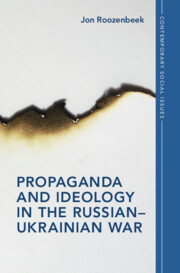Book contents
- Propaganda and Ideology in the Russian–Ukrainian War
- Contemporary Social Issues Series
- Propaganda and Ideology in the Russian–Ukrainian War
- Copyright page
- Contents
- Figures
- Maps
- Tables
- Acknowledgements
- Note on Transliteration
- Abbreviations
- Maps
- Introduction
- 1 A History of Russian–Ukrainian Relations
- 2 The Politics of the Donbas ‘Republics’
- 3 Building a Propaganda Machine
- 4 Newspaper Narratives in Occupied Ukraine
- 5 Identity and Ideology in Online Media
- 6 The Consequences of Propaganda
- Concluding Remarks
- Appendices
- References
- Index
5 - Identity and Ideology in Online Media
Published online by Cambridge University Press: 16 May 2024
- Propaganda and Ideology in the Russian–Ukrainian War
- Contemporary Social Issues Series
- Propaganda and Ideology in the Russian–Ukrainian War
- Copyright page
- Contents
- Figures
- Maps
- Tables
- Acknowledgements
- Note on Transliteration
- Abbreviations
- Maps
- Introduction
- 1 A History of Russian–Ukrainian Relations
- 2 The Politics of the Donbas ‘Republics’
- 3 Building a Propaganda Machine
- 4 Newspaper Narratives in Occupied Ukraine
- 5 Identity and Ideology in Online Media
- 6 The Consequences of Propaganda
- Concluding Remarks
- Appendices
- References
- Index
Summary
Developing an online media presence is of particular importance during a military conflict. Two motivations inform the need for doing so: legitimising the grievances underlying one’s participation in the conflict and delegitimising the opponent by demoralising it or by demonising it in the eyes of third-party observers. Between 2014 and 2018, around forty news sites were set up by the authorities of the Donetsk and Luhansk ‘People’s Republics’. This chapter examines the content produced by four of these news sites. Three main narratives are identified: ‘business as usual’, ‘the cost of the war’, and ‘shaming the enemy’. News sites weaponised emotional discourse, with a focus on evoking fear and anger among their readers. A great deal of attention was paid to portraying Ukraine as a failed state, guilty of war crimes, which has no business continuing the war and which deliberately stymies all attempts at resolving the conflict peacefully. Conversely, ingroup identity was implicitly assumed rather than explored in detail; articles that evoked patriotism or addressed cultural events or local politics rarely explored why readers should identify with the Donbas ‘Republics’.
- Type
- Chapter
- Information
- Propaganda and Ideology in the Russian–Ukrainian War , pp. 83 - 100Publisher: Cambridge University PressPrint publication year: 2024

